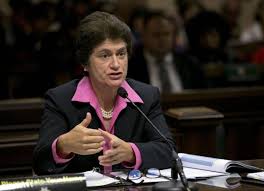
Nearly one year after California State Auditor Elaine Howle issued a scathing report criticizing state regulators for failing to safeguard nursing home patients from unscrupulous operators, only one of her recommendations has been fully implemented.
In a status report released this month, Howle found that of her 12 recommendations to improve nursing home care, five had been partially implemented and six had not been implemented at all.
The only recommendation that lawmakers or regulators have acted upon was legislation requiring nursing home operators to submit profit-and-loss statements for related businesses that service their nursing homes.
The audit was requested by State Sen. Mike McGuire and Assemblymember Jim Wood after they reviewed data compiled by the National Union of Healthcare Workers showing that in 2015 Brius Healthcare owner Shlomo Rechnitz had his nursing homes pay for $67 million worth of goods and services from 65 companies also controlled by Rechnitz.
The audit focused both on whether state agencies were effectively monitoring the financial dealings of nursing home operators and protecting nursing home patients from serial patient care violators.
Howle found that Brius had the worst patient care record among California’s three largest nursing home chains, racking up .52 citations per 100 nursing home beds – nearly double the company’s two leading competitors.
Although Howell said that oversight failures “increase the risk that nursing facilities may not provide adequate care to some of the state’s most vulnerable residents, very little has been done to follow up on her recommendations.
The legislature has so far failed to implement the following recommendations:
1) Redistribute quality assurance fee payments from nursing homes that do not demonstrate adequate quality-of-care improvements to those that do.
2) Require the Department of Public Health to develop by Nov. 2018 a proposal for legislative consideration that outlines the factors it will consider when approving or denying applications from nursing facilities based on each applicant’s ability to provide quality patient care.
3) Require the Department of Public Health to conduct state and federal inspections concurrently by aligning federal and state timelines and require that state inspections occur every 30 months.
4) Require the Department of Public Health to increase citation penalty amounts annually by – at a minimum – the cost of inflation.
5) Require that the Office of Statewide Health Planning and Development, Department of Public Health and Department of Health Care Services collaborate to assess the information that each collects from nursing facilities and to develop a proposal by May 2019 for any legislative changes that would be necessary to increase the efficiency of their collection and use of the information.
6) Require a state agency to develop, implement and maintain for consumers by May 2020 an online dashboard that includes at a minimum information about nursing facilities’ net income and quality of care.
The following recommendations for state agencies are listed as pending:
1) The Department of Public Health should take the steps necessary to ensure that its oversight results in nursing facilities improving their quality of care by amending its application licensing reviews by developing a defined process that specifies how an analyst will determine whether an applicant has demonstrated its ability to comply with state and federal requirements.
2) The Department of Public Health should take the steps necessary to ensure that its oversight results in nursing facilities improving their quality of care by ensuring that it issues citations in a timely manner, especially for immediate jeopardy deficiencies.
3) To ensure that it provides the public with nursing facility information that is accurate and comprehensible, the Office of Statewide Health Planning and Development should update its regulations.
4) To improve the availability and transparency of information, the Department of Public Health should upload all inspection findings to Cal Health Find and review ownership data by May 2019.
5) The Department of Healthcare Services should use current data to revise and update the peer groups it uses to set Medi-Cal rates. In doing so, it should take into consideration the consolidation of the nursing facility industry.
To see the full auditor’s report, click here.